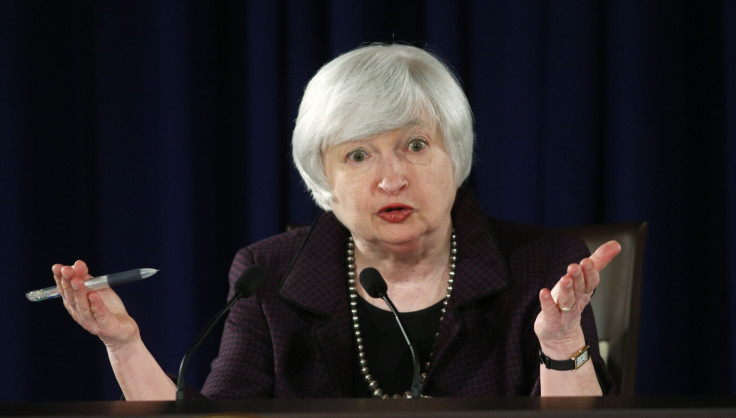Wall Street's Week Ahead: Dow Jones Industrial Average Wavers Ahead Of Janet Yellen's Speech To Congress

U.S. stocks dipped Monday morning following Friday’s record-breaking rally after uncertainty surrounded Greece’s debt deal made with eurozone finance ministers. The deal will extend the country's bailout program for four months; however, Greece must present economic reform plans by the end of the day on Monday to secure its financial lifeline.
Meanwhile, economists are looking ahead to congressional testimony from U.S. Federal Reserve Chair Janet Yellen, who is scheduled to speak during a semiannual two-day Senate Banking Committee hearing Tuesday and Wednesday to discuss the central bank's current monetary policy.
In late morning trading, the Dow Jones Industrial Average, which measures the share prices of 30 large industrial companies, fell 51.10 points, or 0.28 percent, to 18,089.34, and the S&P 500 stock index lost 4.78 points, or 0.24 percent, to 2,105.20. The Nasdaq Composite fell 10.23 points, or 0.21 percent, to 4,945.73.
Greece to Submit Reform Proposals to EU Officials
Under the terms of last week's Greek bailout agreement, Athens is required to submit a letter by Monday to eurozone finance ministers listing all the policy measures it plans to take during the remainder of the bailout period to ensure the country complies with conditions from its creditors. Greece and eurozone finance ministers reached a deal Friday that will extend the country's bailout program for four months, ending weeks of uncertainty and removing immediate fears that Greece would face bankruptcy by the end of the month. The announcement Friday sent U.S. stocks to all-time highs, with the blue-chip Dow posting its first record close of 2015.
"The list will include a series of reforms that the Greek government will propose -- and I underline that," Greek government spokesman Gabriel Sakellaridis told Skai television Monday. "Above all, they will be socially just reforms that aim to fight tax evasion, to fight corruption."
Fed Chair Janet Yellen Testifies Before Congress
U.S. Federal Reserve Chair Janet Yellen is scheduled to speak during a two-day Senate Banking Committee hearing in Washington, D.C., Tuesday and Wednesday to discuss the U.S. economy's health and the monetary policies the central bank plans to use this year to help boost the economy. Economists will be eyeing her statements, looking for clues as to when the central bank will begin raising interest rates, which are currently at historic lows.
Last week, the minutes from the Fed’s January meeting showed policymakers debating whether tightening monetary policy too soon could damage the U.S. economy and dampen the prospects for maximum employment and the targeted 2 percent inflation. Previously, most economists had expected to see a rate hike in mid-2015, but recent weaker-than-expected inflation data suggests an increase in rates could be pushed back to September.
Economists Look Ahead to Inflation, GDP Data
Economists are looking ahead to two economic indicators this week, including a key inflation gauge and a revision to last quarter's gross domestic product (GDP), the broadest measure of goods and services produced across the U.S. economy. The Consumer Price Index (CPI), which measures the average of prices of consumer goods and services, such as transportation, food and medical care, is scheduled to be released Thursday. Economists expect CPI to decline 0.6 percent last month after declining 0.4 percent in December and falling 0.3 percent in November. The drop gives Federal Reserve officials room to pause as they debate whether to hike interest rates this year.
Meanwhile, a revision to U.S. GDP last quarter, when the economy cooled, is set for Friday. The U.S. GDP grew at a seasonally adjusted annual rate of 2.6 percent in the fourth quarter, missing analysts’ expectations for 3.1 percent growth, according to analysts polled by Reuters. Economists now expect economic growth to have expanded at a 2.1 percent seasonally adjusted annual rate last quarter, according to Reuters' data.
Here's the economic calendar for the week of Feb. 23. All listed times are EST.
Monday
- 8:30 a.m. -- Chicago Fed national activity index (January)
- 10 a.m. -- Existing home sales (January)
Tuesday
- 9 a.m. -- Case-Shiller home price index (December)
- 10 a.m. -- Consumer confidence index (February)
- 10 a.m. – Federal Reserve Chair Janet Yellen testimony at Senate
Non U.S.:
- Germany -- Gross Domestic Product (Q4)
- Europe -- European Central Bank President Mario Draghi Speech
- Europe -- Consumer Price Index (January)
- Canada -- Bank of Canada Governo Stephen S. Poloz Speech
Wednesday
- 10 a.m. -- New home sales (January)
- 10 a.m. -- Federal Reserve Chair Janet Yellen testimony at House
Non U.S.:
- Europe -- European Central Bank President Mario Draghi Speech
Thursday
- 8:30 a.m. -- Weekly jobless claims (Week ended Feb. 19)
- 8:30 a.m. -- Consumer price index (January)
- 8:30 a.m. -- Durable goods orders (January)
- 9 a.m. -- FHFA home price index (December)
Non U.S.:
- Germany – Unemployment rate (February)
- U.K. -- Gross Domestic Product (Q4)
- Japan -- Consumer Price Index (January)
- Canada -- Consumer Price Index (January)
Friday
- 8:30 a.m. -- GDP revision (Q4)
- 9:45 a.m. -- Chicago PMI (February)
- 9:55 a.m. -- Consumer sentiment (February)
© Copyright IBTimes 2024. All rights reserved.






















